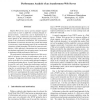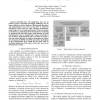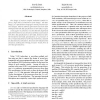247 search results - page 23 / 50 » Characteristics of Modern System Implementation Languages |
IPPS
2009
IEEE
14 years 2 months ago
2009
IEEE
Adopting multiple processing units to enhance the computing capability or reduce the power consumption has been widely accepted for designing modern computing systems. Such confi...
COMPSAC
2006
IEEE
14 years 1 months ago
2006
IEEE
Modern Web servers need to process multiple requests concurrently in order to fulfill the workload demands expected of them. Concurrency can be implemented in a Web server using ...
IPPS
2010
IEEE
13 years 5 months ago
2010
IEEE
Predicting how well applications may run on modern systems is becoming increasingly challenging. It is no longer sufficient to look at number of floating point operations and commu...
WWW
2001
ACM
14 years 8 months ago
2001
ACM
Integrity constraints are an essential part of a modern schema definition language. They are useful for semantic specification, update consistency control, query optimization, inf...
VLSID
2003
IEEE
14 years 8 months ago
2003
IEEE
The design of modern complex embedded systems require a high level of abstraction of the design. The SimnML[1] is a specification language to model processors for such designs. Se...



